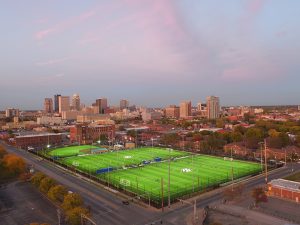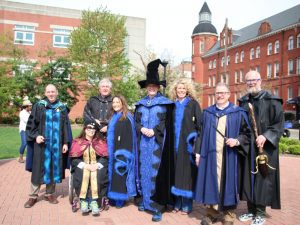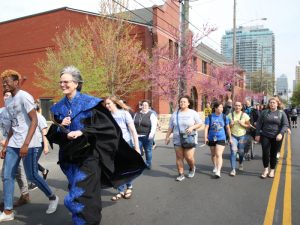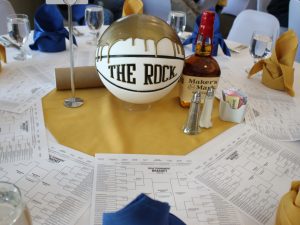Spalding University’s field of dreams project is officially off and running on S. Ninth Street, with shovels in the ground and ballgames not far off.
On Friday, April 12, Louisville Mayor Greg Fischer and Metro Council President David James joined Spalding President Tori Murden McClure, Athletic Director Roger Burkman and Spalding Board of Trustees Chair Jim Rissler in the official groundbreaking of the 7.4-acre athletic fields complex between Eighth and Ninth Street. All the coaches and student-athletes from the Golden Eagles’ soccer and softball programs surrounded them and helped celebrate the start of the construction phase of the project that will give those teams an on-campus home for the first time.
Spalding is building two turf soccer fields – expected to be ready for competition by mid-fall 2019 – and a turf softball field (ready by spring 2020) that will be lighted and available for use year-round.
“I want you all to think about the impact all of you are having on our university, our community and all of these young people you see standing behind me (thanks to your support of the fields project),” Burkman said. “They’re really the reason why we do what we do. … I’m so thankful that (the softball and soccer teams) will have a place to call their homes.”
To be built on the site of a former industrial tract that had long been unused, the new Spalding fields will also beautify the Ninth Street corridor while providing a community resource. The fields, which could also be used for field hockey and lacrosse, will be available for other schools and clubs to rent. Men’s soccer coach Adam Boyer said he envisions the fields being the site of future youth clinics and camps and other types of service events.
“There is no doubt about it that this will be one of the coolest Division III facilities in the country and provide a wealth of benefits to our student-athletes,” Boyer said. “It’ll be a huge boost to our overall student-athlete experience in addition to improving our ability to recruit players to our programs. We’re looking forward to seeing the impact these fields have on our entire student population at Spalding – from intramural opportunities to being a unified source of school provide.
“These fields are a dream come true.”
McClure has said that the athletic fields are, literally, a game-changer for Spalding’s student-athletes and will position them to grow and succeed.
“When you’re a Division III student-athlete, you’re truly a student first and an athlete second. But I firmly believe that college athletics is not extra-curricular; it’s extra curriculum,” she said. “You learn the persistence, the endurance, the resourcefulness that it takes to make a difference not just on the field but in the real world.”
Spalding purchased the property, located between South Eighth and South Ninth and bounded by West Kentucky and West Breckenridge streets, in 2014, and it is using raised funds to build the fields complex. Fundraising continues, and information on how to support the project is available on the Ninth Street: Field of Dreams page.
The fields complex is the latest example of Spalding’s initiative of transforming urban spaces, including ones covered with impervious surfaces, into community resources that beautify campus and the neighborhood. In 2017, Spalding transformed an unused 2.2-acre parking lot at the corner of S. Second and W. Kentucky streets into Trager Park, a public green space with 100 new trees. Other recently created green spaces include Mother Catherine Square in the center of campus.
“This is one of those projects you dream of not just as a president of a university or as a student but also as a mayor, to say, ‘Wouldn’t it be great if we had a great big green swath in our city, right here by Ninth Street, a gateway to the west, an extension to a college campus?’ It’s awesome, and it’s here,” Fischer said. “The persistence and the tenacity of Spalding that you all demonstrate each and every day has led to this tremendous announcement we have today. This is a wonderful thing.”
Fischer spoke at Spalding on the eve of the start of the mayor’s Give A Day week of service program, and he praised Spalding for becoming the world’s first certified compassionate university and he noted that Spalding will be a partner with the city in the Lean Into Louisville program.
Fischer said the city celebrates “what Spalding has done for our city in terms of the soul of our city, the conscience of our city.”
“The Sisters at Spalding and the staff and faculty have really helped set the pace for so much of what we do,” Fischer said. “… Spalding is always there when it comes to making a statement, whether it comes to commemorating Muhammad Ali and the Columbia Gym, or Lean Into Louisville, or being a compassionate university, or in helping make our city an even more beautiful place. This complex is a great win for Spalding and a great win for our city.”
Schaefer Construction is the general contractor for the project. Sabak, Wilson and Lingo Inc. is Spalding’s architecture and civil engineering partner for the fields. Schaefer Construction also announced it is making a $50,000 donation to the fields project on Friday.
Other comments from Friday’s groundbreaking
*Mirza Ugarak, men’s soccer player: “The new sports facility will be a tremendous resource for current and future students to mature into adults who will make the world a better place.”
*Kayla Strehle, women’s soccer player: “Spalding has shown us all just how much it cares about women’s sports with two-thirds of this complex being dedicated to women’s teams.”
*Ally Klein, softball player: “Coming to Spalding has allowed me to build friendships with my teammates and create memories on the field that will last a lifetime. … Having our own field is honestly the one missing piece in what has been an amazing college athletic experience. … It’ll make us better students and better athletes and help bring our community together.”



